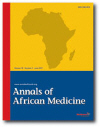
|
Annals of African Medicine
Annals of African Medicine Society
ISSN: 1596-3519
Vol. 7, No. 3, 2008, pp. 120-127
|
 Bioline Code: am08027
Bioline Code: am08027
Full paper language: English
Document type: Research Article
Document available free of charge
|
|
|
Annals of African Medicine, Vol. 7, No. 3, 2008, pp. 120-127
| en |
Factors Influencing the Pattern of Self-Medication in an Adult Nigerian Population
Afolabi, A.O.
Abstract
Background:
Despite the growing research interest in self-medication, little information has been available about its major determinants especially in developing countries. This informed the conduct of this study to determine the major factors that influence the pattern of self medication in a population of market women in Ifako-Ijaiye area of Lagos, Nigeria.
Methods:
Interviewer administered pretested semistructured questionnaire was used to collect data from 205 market women selected by multistage sampling technique.
Results:
The patent medicine dealers were the commonest source of information on medications (31.4%) and where they were obtained (52.2%). The exceptions were the educated (62.5%) respondents who obtained theirs from hospitals and pharmacies. Trade and generic names (61.1%) were common means of drug recognition especially among the educated respondents (P<.05). Education of the respondents was the major factor influencing the practice of self-medication though the pattern was descriptively associated with the marital status and educational level of the respondents (P<.05). Benefits of the practice includes in the order: curing of ailments (58.0%), saving time and money (32.0%) and independence of care (7.0%).
Conclusion:
Literacy and public health education were the major factors influencing the pattern of self-medication among market women. Recommendations on the role of education of market women, patent medicine dealers and the importance of community pharmacy were suggested.
Keywords
Factors; pattern; self-medication; market women; Nigeria
|
| |
| fr |
Afolabi, A.O.
Résumé
Contexte:
Malgré l'intérêt croissant de la recherche sur l'automédication, peu de connaissances sont disponibles sur les déterminants majeurs notamment dans les pays en voie de développement. Cela est à l'origine de cette étude ayant pour but de déterminer les facteurs majeurs influençant le motif de l'automédication dans une population de femmes au marche dans la zone de Ifako-Ijaiye a Lagos au Nigeria.
Méthode:
Un questionnaire semi structuré a été utilise par des enquêteurs pour collecter les données de 205 femmes au marche sélectionnées par une méthode d'échantillonnage stratifié.
Résultats: Les vendeurs de médicaments agréés étaient la source usuelle d'informations sur les médicaments (31,4%) et le lieu ont-elles étaient obtenues (52,2%). Les exceptions concernaient les participantes instruites (62,5%) qui s'informaient auprès des hôpitaux et pharmacies. Les noms de marque et les génériques (61,1%) étaient des moyens habituels d'identification des produits en particulier pour les participantes instruites (p<0,05). L'instruction des participantes était le facteur majeur influençant la pratique de l'automédication bien que le motif soit descriptive associe avec le statut marital et le niveau d'instruction des participantes (p<0,05). Les bénéfices de la pratique comportent par ordre décroissant les soins pour maladies (58,0%), le gain de temps et d'argent (32,0%) et le non dépendance de soins (7,0%).
Conclusion:
La littérature et l'éducation a la sante publique étaient les principaux facteurs influençant le motif d'automédication parmi des femmes au marche. Les recommandations sur le rôle de l'instruction des femmes au marche, les vendeurs de médicaments agréés et l'importance des pharmacies communautaire a été souligne.
Mots Clés
Facteurs, Motif, automédication, femmes au marche, Nigeria
|
| |
© Copyright 2008 - Annals of African Medicine.
Alternative site location: http://www.annalsafrmed.org
|
|
